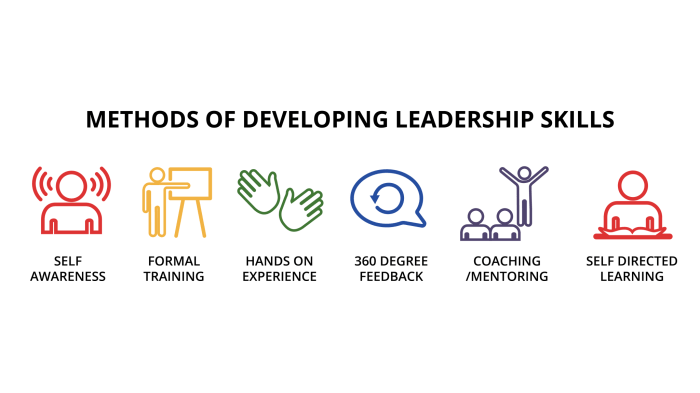Kicking off with Developing Leadership Skills, this opening paragraph is designed to captivate and engage the readers, setting the tone american high school hip style that unfolds with each word.
Leadership skills are like the key to unlocking your true potential, in both personal and professional realms. It’s all about stepping up, taking charge, and making things happen. So, buckle up and get ready to dive into the world of leadership awesomeness!
Importance of Developing Leadership Skills
Developing leadership skills is crucial for success in both personal and professional life. Strong leadership skills can positively impact a team or organization by fostering collaboration, driving innovation, and achieving goals efficiently.
Enhanced Team Dynamics
- Leadership skills help in creating a positive work environment, where team members feel motivated, valued, and empowered to contribute their best.
- Effective leaders can inspire and influence others, leading to improved communication, trust, and teamwork within the group.
- By providing clear direction and guidance, leaders can steer the team towards success and overcome challenges together.
Career Advancement and Success
- Leadership skills are essential for career advancement as they demonstrate your ability to take charge, make decisions, and lead others towards a common goal.
- Individuals with strong leadership skills are often sought after for management positions and are more likely to succeed in leadership roles.
- Being a good leader can open up opportunities for growth, recognition, and increased responsibilities in your career path.
Key Characteristics of Effective Leaders: Developing Leadership Skills

Effective leaders possess a combination of key characteristics that set them apart and enable them to lead with confidence and success. These characteristics include strong communication skills, the ability to inspire and motivate others, adaptability, emotional intelligence, and integrity.
Strong Communication Skills
Effective leaders are able to clearly articulate their vision, goals, and expectations to their team members. They listen actively, provide feedback, and ensure that everyone is on the same page.
Inspiration and Motivation, Developing Leadership Skills
Successful leaders inspire others to achieve their best and motivate them to work towards common goals. They lead by example, showing dedication and passion for their work.
Adaptability
Great leaders are able to adapt to changing circumstances and navigate challenges with resilience. They are flexible in their approach and open to new ideas and perspectives.
Emotional Intelligence
Effective leaders are in tune with their own emotions and those of others. They demonstrate empathy, handle conflicts with tact, and build strong relationships based on trust and respect.
Integrity
Leaders who exhibit integrity are honest, transparent, and ethical in their decision-making. They uphold their values and principles, earning the trust and loyalty of their team members.
Strategies for Developing Leadership Skills
Developing leadership skills requires a combination of self-awareness, continuous learning, and practical application. Here are some strategies individuals can use to enhance their leadership abilities:
Enhancing Communication Skills
Effective communication is essential for a leader to convey their vision, goals, and expectations clearly. Here are some tips to improve communication skills:
- Practice active listening to understand the perspectives of team members.
- Be concise and articulate when delivering messages.
- Seek feedback to ensure your message is understood.
Improving Decision-Making Skills
Leaders often face tough decisions that can impact their team and organization. Here are some tips for making better decisions as a leader:
- Consider all available information before making a decision.
- Evaluate the risks and benefits of each option.
- Involve key stakeholders in the decision-making process.
Enhancing Problem-Solving Skills
Leaders need to be adept at finding solutions to complex problems. Here are some strategies to improve problem-solving skills:
- Break down the problem into smaller, manageable parts.
- Brainstorm potential solutions with your team.
- Consider different perspectives to find innovative solutions.
The Importance of Mentorship and Continuous Learning
Mentorship and continuous learning play a crucial role in leadership development. Here’s why they are important:
- Mentors provide guidance, support, and valuable feedback to help you grow as a leader.
- Continuous learning ensures you stay updated on the latest trends and best practices in leadership.
- Seek out mentors who can offer insights and advice based on their own experiences.
Challenges in Developing Leadership Skills

Developing leadership skills can be a challenging journey for many individuals. From overcoming self-doubt to navigating conflicts, there are various obstacles that can hinder one’s growth as a leader. However, with the right strategies and mindset, these challenges can be overcome, leading to personal and professional growth.
Overcoming Self-Doubt
- Practice self-reflection and identify your strengths and areas for improvement.
- Set achievable goals and celebrate small wins to boost confidence.
- Seek feedback from mentors or peers to gain perspective and build self-assurance.
Dealing with Resistance
- Communicate openly and transparently to address concerns and build trust.
- Listen actively to different viewpoints and find common ground for collaboration.
- Lead by example and demonstrate resilience in the face of challenges.
Navigating Conflicts
- Develop conflict resolution skills and learn to manage emotions effectively.
- Encourage open dialogue and create a safe space for team members to express their concerns.
- Focus on finding solutions and fostering a positive work environment.
Real-Life Example
“I used to doubt my ability to lead a team, but through continuous learning and practice, I gained confidence in my decision-making skills. By facing challenges head-on and seeking feedback from my colleagues, I was able to grow as a leader and inspire others to do the same.”
